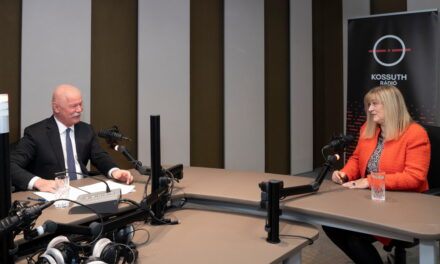Although we are living in times of war, this title does not refer to war, but to an economic policy concept that can help our country survive in the turbulent times that are expected or already exist.
The sword refers to the fact that we must be out on the world market in specific economic segments and to compete with the market forces present there, and the shield indicates that we must protect ourselves, that is, the Hungarian economy, wherever possible.
From the end of the first Cold War, from the beginning of the 1990s to the end of the 2000s, world trade developed very quickly, significantly exceeding the growth of the world's GDP. Then, following the financial crisis originating in the United States, this dynamic was broken, and since then world trade has been at most It grows in proportion to GDP. This means that, while previously the proportion of foreign trade measured in GDP increased strongly worldwide, in the last decade and a half it has stagnated or declined, i.e. international relations are not expanding overall. There are several reasons for this. On the one hand, international cooperation has already reached such a high level that it threatens the security of supply of individual countries, which was shown spectacularly in the wake of Covid-19, and on the other hand, the rise of China and the strengthening of Russia have led to the formation of new geopolitical fault lines.
With the rise of China, the United States feels its positions increasingly threatened,
and therefore wants to restrict trade with China and impose this on its allies as well. In principle, the restrictions would only cover "sensitive" dual-use, military and civilian products, in reality, since electronics are already used everywhere, the restriction could apply to a wide range of products, and there is no predictable rule on which ones, the United States in practice can declare it a strategically sensitive product. The restrictions are already affecting the allies, for example a German laser manufacturer is being prevented from selling its products to China. In addition to the above, there are European Union sanctions against Russia, which in practice do not put Russia in a difficult situation, but individual member states of the union.
The climate policy of the European Union also causes enormous uncertainty and even greater economic damage,
because they started supporting developments that are demonstrably a dead end (for example, wind and solar energy, electric cars, hydrogen economy) and as soon as the large-scale and unsustainable support ends, the preferred industries will collapse, dragging down those who work for them.
It can be predicted with great certainty that the international situation will "intensify" in the next decade, even if the Russian-Ukrainian war ends with some kind of compromise and does not turn into an even bigger conflict. A new Cold War begins, where one side is the United States and its allies, and the other is China, Russia, Iran and their economic allies (BRICS+).
The economic relations between the two camps will be determined by the unpredictable policy of the United States at any given time and from the point of view of the allies.
But while the politics of the United States is just unpredictable, that of the European Union is completely irrational (immigration, climate policy, legal uncertainty due to the constant reinterpretation of treaties), which sooner or later must lead to sobering up, but it will again be the source of another confusing reorganization.
Due to Hungary's geographical location, it lies on a geopolitical fault line, where the East and the West have often collided throughout history. Under normal circumstances, our country could also be a bridge between the East and the West, enjoying the benefit of the intermediary role (trade). But precisely because of the above-mentioned circumstances, this mediating role is highly limited. The question is, anticipating this, what centers of gravity should Hungary's economic policy form?
First of all, it should be emphasized that
the Hungarian economy's exposure to foreign countries is excessive,
especially when the aforementioned uncertainties are taken into account. For example, in Denmark, which is smaller than us and is well integrated into the Western world, the ratio of foreign trade in GDP is 69 percent, while in our country this ratio is 81 percent, and moreover, the domestic external balance breaks down at the slightest fluctuation in the world economy, which leads to indebtedness, in the best case, the foreign leads to an increase in the stock of working capital (FDI). But the import of working capital is not a panacea either, because it may be possible to avoid borrowing at the moment, but in the longer term it results in a continuous export of income. At the moment (2022), the foreign capital invested in Hungary takes 13 billion euros out of the country per year, and in 2022 the current account deficit was about this amount (the current account balance determines whether the country is in debt or not). The balance of the current account depends primarily on the balance of trade, so for the sake of the balance, a policy must be pursued that strives for a trade balance surplus. This often contradicts the rate of economic growth, which has become a general indicator of success and a major factor in international competition. We got into debt in the 1970s as well (the effects of which continue to this day) because the economic and political leadership put growth above balance (of course only as long as it could).
In order to achieve sustainable economic development and avoid indebtedness, we must apply economic policy priorities that increase the export capacity of domestically-owned companies, taking geopolitical realities into account as widely as possible, and not relying on the success of one country.
Increasing the export capacity of domestic companies and developing the research base behind the companies could therefore be the "sword" in Hungarian economic policy.
As for the "shield", about 80 percent of the expenses of an average family in Hungary consist of products and services that can be economically satisfied from a geographically close area (around 100 kilometers), of course, only if we do not want to import everything from China. This would be especially important in the case of food industry products, where today multinational companies have intruded between agricultural production and market sales, thanks to the thoughtless privatization with which we practically destroyed our entire industry together with the research institutes behind it.
Of course, the European Union does not make it easier for less developed countries to catch up, EU subsidies do not serve to make industry or agriculture more competitive. This can be excellently demonstrated in the case of the southern European countries, especially Greece and Portugal, which countries actually held back until they were not members of the union, after which their development slowed down, and as a result of the introduction of the euro they became heavily indebted (because they could not support their export sector by devaluation due to the lack of their own currency ).
The EU's neoliberal-inspired economic policy (the enforcement of competition, actually the support of multinationals) could primarily be circumvented by creating producer-consumer cooperatives at the local level,
where the movement of goods and money is within the cooperative and EU rules cannot be applied to it. Such solutions are not economical from a narrow economic point of view (because Chinese imports are cheaper), but they can ensure supply even when there are disturbances in the world economy, and - not least - ensure local employment.
Unfortunately, Hungarian economic policy has been guided by neoliberal ideas for at least five decades (of which I have an overview from my own experience), which proclaim the omnipotence of the market against conscious economic development, even though international examples clearly prove that catching up and achieving economic policy goals is only possible with conscious and persistent economic policy priorities .
The author is an economist, advisor to the National Forum, member of the C12 group
Source: Magyar Hírlap
Cover image: PS TV













